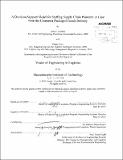| dc.contributor.advisor | Roberto Perez-Franco. | en_US |
| dc.contributor.author | Castillo, Aura C. (Aura Carolina) | en_US |
| dc.contributor.author | Ucev, Ethem | en_US |
| dc.contributor.other | Massachusetts Institute of Technology. Engineering Systems Division. | en_US |
| dc.date.accessioned | 2013-09-24T19:42:39Z | |
| dc.date.available | 2013-09-24T19:42:39Z | |
| dc.date.copyright | 2013 | en_US |
| dc.date.issued | 2013 | en_US |
| dc.identifier.uri | http://hdl.handle.net/1721.1/81097 | |
| dc.description | Thesis (M. Eng. in Logistics)--Massachusetts Institute of Technology, Engineering Systems Division, 2013. | en_US |
| dc.description | Cataloged from PDF version of thesis. | en_US |
| dc.description | Includes bibliographical references (p. 55-56). | en_US |
| dc.description.abstract | Reducing or increasing labor force is not always effective when done without a thorough analysis. Organizations could face negative consequences such us unbalanced workload, inefficient procedures, lost sales, and negative work atmosphere. An increasing number of organizations are centralizing operations in order to optimize labor costs. However, not all companies assess the new number of employees required after centralization takes place, and for those companies that actually do this analysis, there are not quantitative tools, as far as we know in the literature, that can help them estimate the workforce required. This thesis project provides practitioners with a new mathematical model to estimate an appropriate number of production planners required for the supply chain planning department of a company in the consumer packaged goods industry. Using bivariate correlation and multiple regression analysis, we explored whether a relationship exists between the required number of production planners in the new centralized offices of the Company and 13 factors that impact employee's workload. The resulting regression model accounts for 98% of the variance of the number of planners. | en_US |
| dc.description.statementofresponsibility | by Aura C. Castillo and Ethem Ucev. | en_US |
| dc.format.extent | 56 p. | en_US |
| dc.language.iso | eng | en_US |
| dc.publisher | Massachusetts Institute of Technology | en_US |
| dc.rights | M.I.T. theses are protected by
copyright. They may be viewed from this source for any purpose, but
reproduction or distribution in any format is prohibited without written
permission. See provided URL for inquiries about permission. | en_US |
| dc.rights.uri | http://dspace.mit.edu/handle/1721.1/7582 | en_US |
| dc.subject | Engineering Systems Division. | en_US |
| dc.title | A decision support model for staffing supply chain planners : a case from the consumer packaged goods industry | en_US |
| dc.type | Thesis | en_US |
| dc.description.degree | M.Eng.in Logistics | en_US |
| dc.contributor.department | Massachusetts Institute of Technology. Engineering Systems Division | |
| dc.identifier.oclc | 858277788 | en_US |
